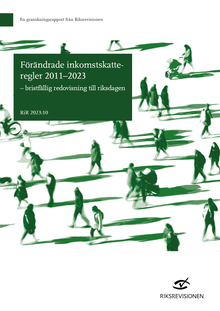Incomplete and partly embellished picture of amended income taxes
During the years 2011–2023, annual income taxes were reduced by SEK 100 billion. The Swedish National Audit Office’s audit shows that the Government presented the Riksdag with an incomplete picture of what the effects would be.

Photo: Plainpicture
During the period 2011–2023, a number of amendments were made to the income tax rules. The largest reforms have involved a higher basic deduction for people over 65 years and increases in the earned income tax credit.
The Swedish National Audit Office (Swedish NAO) has audited the Government’s reporting to the Riksdag of effects on the employment rate, the number of hours worked and income distribution of proposed tax amendments.
The audit shows that taken together, the amendments have led to tax reductions amounting to around SEK 100 billion per year. The amendments have also led to a more even income distribution, and fewer households with a low economic standard. However, for the group with the very lowest incomes, the reductions in tax have not led to any significant improvements.
Another effect of the tax amendments is that conditions for a high employment rate have improved. All other things being equal, the tax reductions have led to an increase in employment by about 25,000 new jobs, according to the Swedish NAO’s assessment. This, in turn, leads to a larger tax base, increasing tax revenue for the State. Taking that into account, State costs for the tax amendments amount to around SEK 90 billion per year.
At the same time, the audit shows that the incentives to work have been weakened by higher benefits such as raised unemployment insurance benefits and a raised ceiling for the sickness compensation.
“How raised levels in the compensation systems will affect the long-term conditions for high employment rates is uncertain, but it probably counteracts the desired impact of reduced taxes,” says Anna Brink, Project Leader for the audit.
The audit covers the analyses made by the Government concerning the expected effects of the tax amendments. The overall assessment is that the Government has provided an incomplete and partly embellished picture of how the changes would affect employment, the number of hours worked and income distribution.
It involves the raised basic deduction for people aged over 65 years, which has led to a reduced tax by about SEK 40 billion per year. It also involves the increases in marginal taxes for people with the highest incomes.
“When the impact is expected to be positive, the Government’s reports on the impact on the employment rate and the number of hours worked are sound. However, for proposals that may be assumed to have a negative impact, no calculations are presented at all,” says Anna Brink.
The Riksdag has thus taken decisions on amended tax rules that can be assumed to have a negative impact on the labour market without have had access to documentation that sufficiently describes the expected consequences.
“The Government should have reported the effects of the amended taxes to the Riksdag. The Riksdag’s decisions would then have been founded on a clearer and fairer basis,” says Auditor General Helena Lindberg.
One reason for these circumstances is that the Government lacks relevant models for analysing labour supply among older people. However, with regard to reporting the expected effect of increasing the marginal taxes, for example by phasing out the earned income tax credit, there are established models available that should have been applied, according to the Swedish NAO.
Recommendations in brief
The Swedish National Audit Office recommends that the Government:
- improve the impact analyses in their government bills in this area
- develop a model for calculating the effect on labour supply among older people.
See the report for the recommendations in full.
Press contact: Olle Castelius, phone: +46 8-5171 40 04.
Presskontakt: Olle Castelius , telefon: 08-5171 42 06.
Share in social media and by e-mail
Contact form
Send your questions or comments via the form below and we will make sure that they reach the right member of staff. Please state if your question concerns the information on this particular page.


